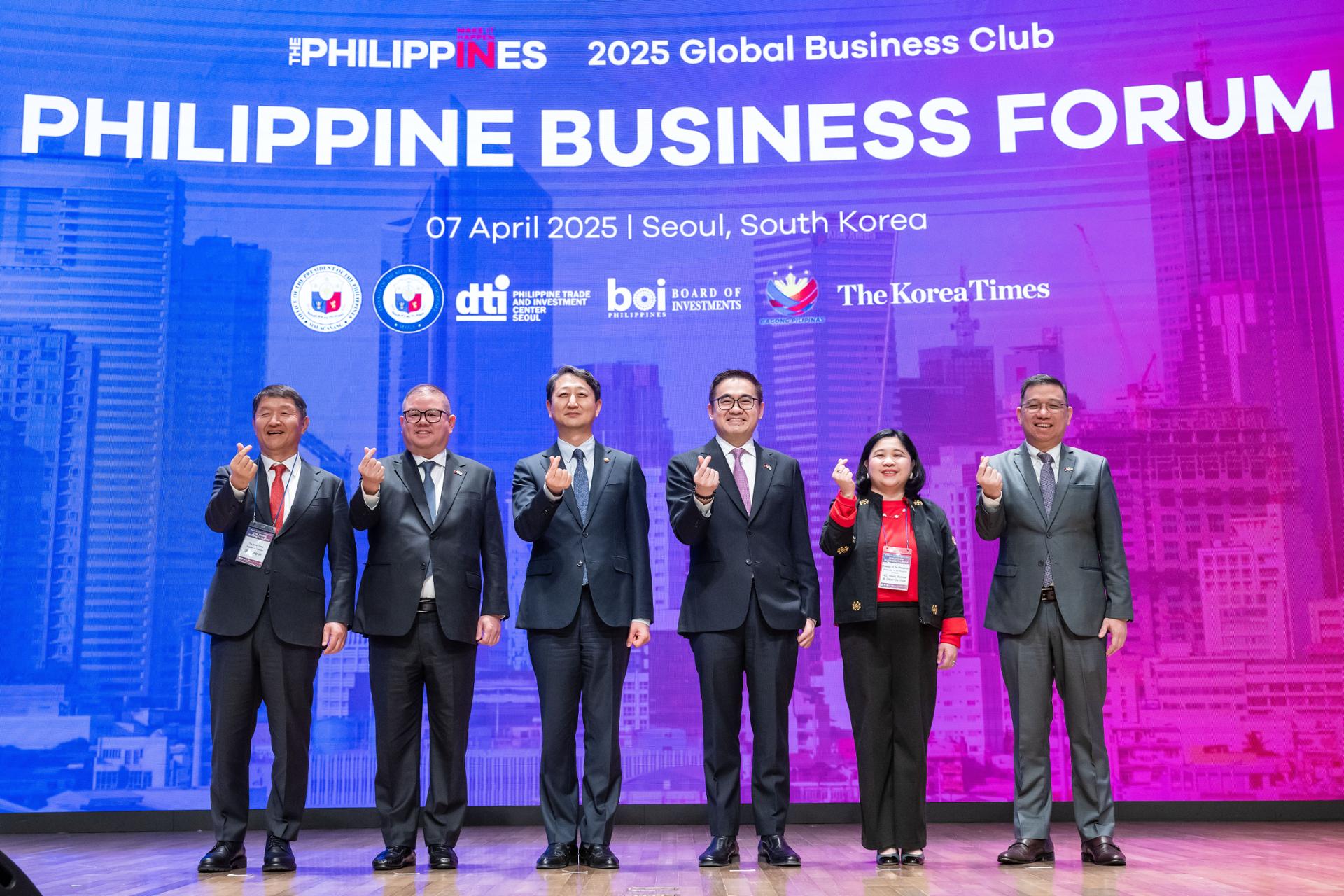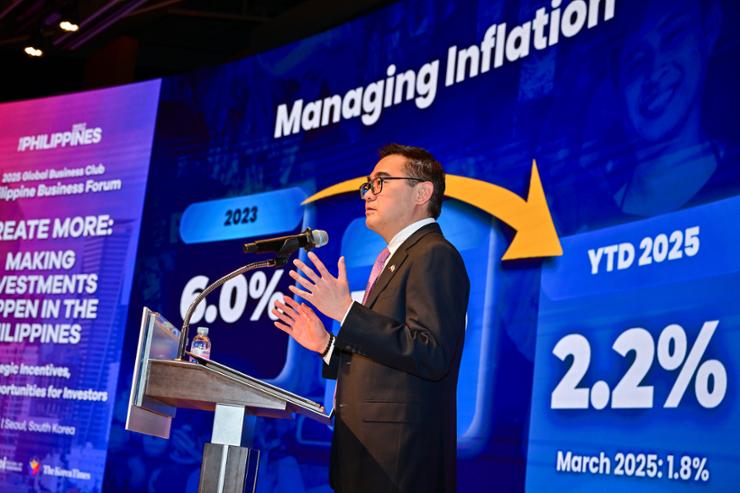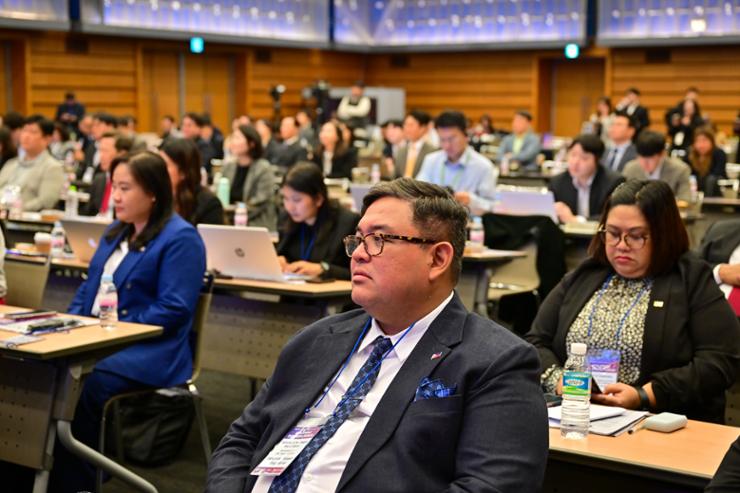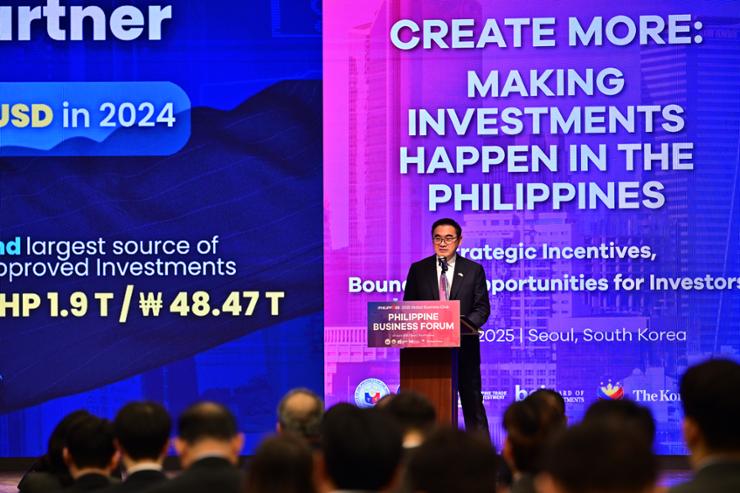PH encourages Korean firms to seize opportunities from new initiatives

Korea's Trade Minister Ahn Duk-geun, third from left, and Special Assistant to the President of the Philippines for Investment and Economic Affairs Frederick Go, third from right, pose during the Philippine Business Forum, co-hosted by The Korea Times and the Philippine government, at the Korea Chamber of Commerce and Industry in Seoul, Monday. From left are Korea Times President-Publisher Oh Young-jin, Philippine Department of Agriculture Secretary Francisco P. Tiu Laurel Jr., Ahn, Go, Philippine Ambassador to Korea Theresa Dizon-De Vega and Philippine Department of Trade and Industry Undersecretary and Board of Investments Managing Head Ceferino Rodolfo. (Korea Times photo by Shim Hyun-chul)
A top Philippine official on economic affairs encouraged Korean investors to seize growing opportunities in the Philippines, citing a sweeping tax reform law and a new wave of infrastructure and industrial initiatives that he said will drive long-term growth.
“Our message is clear: The Philippines is primed for investments, and we want the world to take notice,” Frederick D. Go, special assistant to the president of the Philippines for investment and economic affairs, said during a keynote address at the Philippine Business Forum in Seoul, Monday, highlighting the first stop of the country’s CREATE MORE international roadshow, under the slogan "Making Investments Happen in the Philippines."

Frederick D. Go, special assistant to the president of the Philippines for investment and economic affairs, delivers a keynote speech during the Philippine Business Forum at the Korea Chamber of Commerce and Industry in Seoul, Monday. (Korea Times photo by Choi Won-suk)
The event was hosted by the Philippine Board of Investments (BOI) and the Philippine Trade and Investment Center in Seoul and organized by the Philippine Embassy in Korea, the Office of the Special Assistant to the President for Investment and Economic Affairs and The Korea Times.
Go emphasized his country’s landmark corporate recovery and tax incentives for enterprises to maximize opportunities for reinvigorating the economy, or CREATE MORE Act, signed into law four months ago as a “game-changer” for foreign investors.
“It signals to the world that the Philippines is open for business,” Go said. “We offer 14 to 27 years of fiscal incentives — income tax holidays, enhanced deductions and special corporate income tax — with up to 40 years for highly desirable projects.”

Korean and Philippine business and government officials attend the Philippine Business Forum at the Korea Chamber of Commerce and Industry in Seoul, Monday. (Korea Times photo by Choi Won-suk)
Korea remains one of the Philippines' most important economic partners, Go said, noting that in 2024, Korea ranked as the Philippines’ fourth-largest trading partner, sixth-largest source of net foreign direct investment and second-largest source of approved investments.
Go said he held talks with Korea's Minister of Trade, Industry and Energy Minister Ahn Duk-geun prior to the forum and will meet with top executives at Korean firms to “explore collaborations in high-growth industries such as electric vehicles, renewable energy, mining and advanced manufacturing.”
The CREATE MORE Act is already yielding results, Go said, with 1.9 trillion Philippine pesos ($33 billion) in registered investments in 2024 alone.
“It enhances the ease of doing business, reduces costs and creates predictability — factors that boost confidence among you, our partners.”
He cited additional benefits under the law, including 100 percent power expense deductions and a 50 percent reinvestment allowance for manufacturing and tourism firms.
The Philippine government is also aggressively improving its business environment, passing the Public-Private Partnership (PPP) Code, modernizing capital markets and privatizing three major airports in less than three years.
“In less than two years, we enacted the PPP law after 29 years, implemented short selling after 27 years, and rolled out the Manila International Airport as a PPP project,” he said. “This administration really means business.”
Go highlighted that the country’s Build Better More program includes 212 flagship projects worth nearly 9.8 trillion Philippine pesos, with 48 ready for PPP investments.

Frederick D. Go, special assistant to the president of the Philippines for investment and economic affairs, delivers a keynote speech during the Philippine Business Forum at the Korea Chamber of Commerce and Industry in Seoul, Monday. (Korea Times photo by Choi Won-suk)
He also highlighted the nation's improving macroeconomic fundamentals, including a 5.6 percent average GDP growth over the past two years, declining inflation (down to 1.8 percent in March), a record-high 48.8 million employed Filipinos in 2024 and rising credit outlooks from international ratings agencies.
“We are committed to what we call the ‘Road to A,’” Go said, referencing the administration’s goal to achieve an A-credit rating from a major agency before the end of its term in 2028.
Key sectors targeted for foreign investments include semiconductors, mineral processing (particularly nickel and copper), pharmaceuticals, food and agriculture, steel, renewable energy, infrastructure and tourism.
He pointed to the Luzon Economic Corridor, anchored by the Subic-Clark-Manila-Batangas freight railway, as a critical logistics hub attracting interest from Korea, as well as the U.S., Japan, the U.K., Australia and Sweden.
Go celebrated the close cultural ties between Filipinos and Koreans.
“Koreans frequent our country to experience our attractions and hospitality. Likewise, we Filipinos have embraced Korean culture with great enthusiasm — from K-pop and K-dramas to cuisine and electronics.”
The Philippines and Korea cemented their economic ties further with a free trade agreement that entered into force in late 2023, which Go called a “historic milestone.”
“As we look to the future, the Philippines is no longer just open for business — it is the place to invest, expand and thrive,” he said. “To our Korean partners and investors, now is the time to create more — more investments, stronger partnerships and greater opportunities for shared success.”